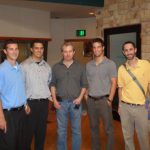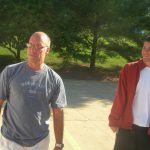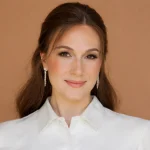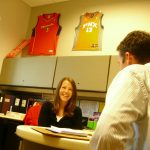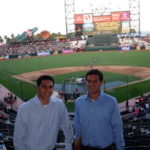Joanne Gordon is an author, journalist, wife and mother, and not necessarily in that particular order. As a child, she wrote what she calls “Judy Bloom-esque” narratives, about the trials and tribulations of a pre-teen. A natural interest in “the human part of business” led Joanne to a fact-checking position at Forbes magazine. Four years later, she took a leave of absence from Forbes, to write a book called Roadtrip Nation. Joanne has written her own book about professional women, but she prefers to help others develop their ideas, knowing that good ideas and good writing do not always come hand in hand.
 “People want answers,” she says, “I don’t consider myself a career expert, but I report what I see.” For reporting what she has seen, Joanne has been praised for her journalistic point of view, in a world that is too often fictionalized or hyperbolized. For now, Joanne finds herself at a crossroads of sorts, analyzing the “connection of who you are and what you do.” As the mother of Theo, 2, she is wise to take some time and think about her life, not simply rushing from one paycheck to the next.
“People want answers,” she says, “I don’t consider myself a career expert, but I report what I see.” For reporting what she has seen, Joanne has been praised for her journalistic point of view, in a world that is too often fictionalized or hyperbolized. For now, Joanne finds herself at a crossroads of sorts, analyzing the “connection of who you are and what you do.” As the mother of Theo, 2, she is wise to take some time and think about her life, not simply rushing from one paycheck to the next.
Interview
This interview took place on Joanne Gordon’s beautiful patio overlooking Seattle’s waterfront. Jay stayed in the RV to edit video. Noah spent most of his time filming Joanne’s cat Max while chiming in from time to time. Brett and Zach hung out at the table and asked Joanne questions. I think Joanne gave us brownies. She talked about what it takes to be a writer and how to find happiness in work. She’s also the author of Be Happy at Work.
Joanne Gordon
I have some good people that you could interview for this. You’re going to Vegas? I could probably hook you guys up with the CEO of MGM Grand. I’ll tell you someone to call there. You’ll get a great tour and an interview at MGM. They’re awesome. They’ll treat you well. And the CEO is really cool. The woman, who I talk to all the time, will definitely see you.
Zach: Sweet!
Brett: You’ve written around five books. Do you have a favorite?
I often say that everyone has one good book in them. I don’t know if I have another book inside of me that’s just me. That’s why I like helping other people write their books. But Be Happy at Work was my idea from the start. To see something come from an idea that you have when you’re riding the train to work and all of a sudden there’s a book. It’s a long process to get to that point, but to see it actually happen is amazing.
Brett: It really is a long process right? (As I transcribe this interview at 5:23 a.m)
It really is a long process. And you have to have a lot of faith going into it. There’s a lot of passion involved, but there’s also a lot of practicality in terms of marketing it. When I first wrote the book, the whole publishing world was like a big dark forest to me. I felt like everyone was trying to screw me or take advantage of me. I really didn’t know the questions to ask. Once I became more familiar with it, I became much more comfortable with it.
You used to write for Forbes?
Yeah. How do you want to do this? You want to do this chronologically? You want to just throw questions at me?
We’ll just throw questions at you.
Cool. So I went to New York after graduate school. I went to Northwestern for journalism school. I went to New York. I knew I wanted to be a writer, so I knew I had to go to Manhattan. I think I had $1500 that I got from a scholarship in graduate school, and that’s all the money I had. I knew I had to find an apartment and live in New York and find a job.
The first job that I got was actually at a trade magazine that covered the retail industry. My job was to be the real estate reporter, which meant that I had to write about malls. And I hate malls, personally.
I think one of the things about careers is that sometimes you have to do things you don’t want to do to get to where you want to go. It was really supportive, they paid me decent money that I could live in New York and they gave me great experience. So the topic I didn’t love, but the processes- the reporting, the writing, getting great clips- I just knew it would sort of get me to where I wanted to go. I just gave it my all.
Again, not every job is perfect. Sometimes you have to say, ‘What can I get from this that will get me to where I think might be close to perfect?’
So I did that for about a year. Visited malls around the country. Which is really less than exciting.
Zach: They’re probably all soooo different.
No. They’re not. (Laughs). But I will say this. The people who own the malls around the country are characters. That’s what was interesting. That’s what would always interest me about business.
I picked business to be the subject of my writing and my reporting for two reasons.
- Because I’ve always had this natural interest in the human part of business. Like you, I’m just interested in what motivates people. When I was a little girl, I remember my friend’s father would come home from work and I’d be playing with their daughters. I just wanted to know what they did all day! But they didn’t want to tell me.
I think I’ve always been interested in what drives people. We sense there was a connection people have with their work and with their jobs that really went beyond making a living. Looking at that from a reporter’s perspective was really interesting to me.
So the personalities, the people who own the malls, the personalities behind all businesses are fascinating to me.
But my goal was to work at one of the big business magazines. I knew nobody. Nobody. I didn’t know anyone anywhere and I just kept asking anyone I ever met if they knew anyone who worked at Forbes, Fortune, or BusinessWeek.
Again, you get leads from the places you least expect them. A family friend of ours who we had grown up with their son went to school with someone who was a reporter at Forbes who I called. He was great. He said one his good friends still works there. He worked in the Washington Bureau. He said to call her, she is a working woman.
So we had lunch when I was in New York. She said she knew the person who was in charge of hiring reporters. So I called her. She said I could come in just to meet her. So I did on a totally informational basis. Who do you hire? What do you want from people?
Two weeks later I got a chance to interview for a real job. It was as a fact checker which is was a demotion from what I was doing, but that’s how you start at a lot of major publications.
That’s a trail right there.
You just start. My job was to spend fifty percent of my time fact checking, which means that once a reporter was done writing their story, you go over it again and act like you’re re-reporting it. You have to make sure that there’s no errors in it, and that everyone is saying what they said and that it was expressed correctly so we didn’t get sued.
That was…at first, it was great. I did it for two and a half years. That was sort of the cycle at Forbes. A lot of the reporters would either be fact checkers forever, or they would move on and be promoter to a writer. Some would leave. I knew I had about a two and a half year window to move on. So I was really lucky.
How old were you when you started working there?
- I think. Because I went to grad school late at 28. I was a little late for journalism. Everyone was younger than me.
Roadtripnation came when you were working there?
I was at Forbes for four years. They’re just persistent little buggers. They had some guy who was helping them do some outreach and it was after September 11th and I just took the time to meet them. It was a hard sell. I thought what they were doing, which is just what you’re doing, I totally got it.
My editors didn’t, but I made it work. I wrote this little story in Forbes, like half a page. After it ran, I got a call from this agent who asked if they had a book agent. I said no, but I know they want to write a book, and I know they have a book in them, and I want to be their writer.
Which I think from a career lesson standpoint, what I always take from that and what I tell people is that you need to ask for what you want. Who could have predicted she was going to call me and ask me that. But I just knew it. It was dangling in front of me and I’m like, ‘They’re going to need a writer. And I want to do it because I get it.’
It turns out they already had agents. We ended up going with another literary agent. I called them up and asked if they were up for it. They were like, ‘Yeah. Definitely.’ So we worked together and put together a book proposal. We did the rounds in New York. I think we had a great bid after we met with Ballantine. They called us with a great bid, so we did it. And it was awesome. It was great. It was amazing.
The first agent who called me, I stayed in touch with her because I told her my idea, the book I was thinking about. And she said let’s do that after we do Roadtripnation. I’m like, excellent. I was kind of smitten.
I realized I really like the book writing life. For a lot of different reasons. I think the bottom line that I always think to myself is that there are a lot of ways to be a writer. I think you guys are probably catching me at a place in my life where I’m kind of wondering what the next way is going to be for me. If it’s going to stay this way.
I think you go through periods in your life where you know the right job is the right job for a particular time. But you change! Different things are important to you, plus you learn things. You always want to keep learning and be challenged. So I’m doing a lot of thinking right now about how I want to keep writing a part of my life.
Zach: What are some of the conflicts you’re having?
Some it’s financial. To be honest. Book writing is great, but you don’t know when the money is going to come in. You don’t know how much is going to come in. You can work on a proposal before you write a book, or before you sell a book. You can write a whole book and not make a dime. And you never know how much a publisher is willing to pay.
It’s hard to predict what you’re going to make. I could not do this if I did not have a spouse. My husband who also has income. If I was single, this would be much more difficult unless I had another means. Unless I had another job that was coming in. It would be real tough.
Noah: Would you still be doing it?
I can’t answer that, because I don’t know.
Noah: I’m probably a pretty creative person. I can emphasize with that.
When I wrote Roadtripnation I was single. I took a leave of abcense from Forbes. So I didn’t get paid during that time, but I did get a little up front money from the book too. I got some up front money. There are always ways to make things work. But again, you have to be practical about some things as well.
One of the reasons why I went into business reporting- business magazines are one of the few publications that actually have staff writers. So most magazines, editors and everyone else are freelance. So you’re guaranteed a salary. I was also interested in it, but I’m a first born child. I’m a practical person. So a lot of the decisions I sometimes make…
So have you ever lost that drive in writing?
I think you get burnt out. There’s so many different ways to write. I think sometimes, people use the term, ‘I’m a writer.’ That really means that they’re a thinker. They’re someone who also comes up with the ideas. So you could also be a great writer, but more in an administrative capacity where you know other people’s ideas. Maybe in a marketing or an advertising context. Maybe it’s in something I do now which is collaboration.
I take other people’s ideas like Pursue the Passion and I see all the information you have, and ask, ‘How can we package this into a book?’ I just see it. I either get it or I don’t. If I don’t get it, I shouldn’t work on the project.
But one of the things I’ve learned is you just have to know what your strengths are, and what you really like to do. I mean sometimes those go hand in hand. When I did my book and interviewed a hundred women around the country about what they love their jobs, I came up with three themes that they all shared. I really do apply it to my own life right now in terms of thinking how to figure out what to focus on.
What are those three themes?
The first one was process. That means that you’re skilled at and challenged by the main activities your job requires. So you have to think about the verbs of what you do everyday. A) It should be something you have a natural inclination towards, but not so easy that you’re not intellectually engaged in it. There should always be a challenge there, but no unattainable. So a lot of that has to do with the notion of ‘flow.’
There’s a book called Flow, and there have been several subsequent books. There’s a professor who was out of the University of Chicago who came up with the notion that when you’re in ‘flow,’ which is what people strive for when they think about happiness. He did a lot of happiness research around the world and ‘flow’ is a state of mind where you’re so involved that you don’t think about anything else that is going on. Time flies or it goes very slow.
Again, think of a rock climber. You’re challenged, but you’re not so challenged that it’s impossible. That it’s defeating and you can’t make it work. For me, that’s what the process of writing often is. I love writing. I love the puzzle part of it. Putting all the pieces together and creating. I often describe writing as putting together a puzzle, but someone threw away the top of the box. At the end of it, it looks like a picture that’s always been there. But when you first get it, it’s just pieces everywhere. And you have to figure out what the picture is. And I love that. I love seeing things go together and making connections.
Things that I’m not as good at, or don’t love as much, is some people are a natural idea factory. They’re just constantly spitting out ideas. People who write freelance, that’s what they should be doing. Because you might throwing an idea at one magazine and then throwing a different one at another. You have to have so much in your pipeline that you constantly have to have things working for you. So the money is also coming in to. That’s not my skill.
I feel a lot of this going into it is knowing what your skills are. I can take an idea and see what to do with it. But sometimes I’m not great at having it pop out at me.
So I missed the three.
Okay (laughs). So that was process. The next one is purpose. You have to feel good about what you’re doing. Essentially. It doesn’t have to be altruistic. You just have to believe in it.
The third one is people. Mainly, people is about respecting who you work with. It doesn’t mean you have to like them. It doesn’t mean you have to be best friends with them, but you have to respect them. So my guess is that you guys all like each other, probably. You probably have a good time together, but you also respect each other. Even though you’re living and sleeping next to each other in a crowded RV, there’s that degree of professionalism that you respect what goes on.
I think if I was writing for a publication but I didn’t respect my editor, that’d be really tough. So if those three things are together, that’s sort of this ideal state.
Zach: Do you think that’s exclusive to women for some reason?
I don’t know. I know women who have never talked about the money. But there’s a lot of research also that shows for individuals, male or female, money only takes you so far. So it’s true.
For the book I’m working on now, you hear this all the time, you get a raise and it’s awesome, but you baseline again pretty quickly. So you want to be paid fairly and commensurate with what you do, and I believe strongly about that, especially for women. We have to ask for what we deserve. And if you’re being underpaid, that can do a lot more detrement than being overpaid. That will actually increase your satisfaction.
So is that pretty much what you took away from writing that book?
It’s kind of it. I really look for themes that I apply.
That’s what I’m trying to do right now. Look for common themes in passionate people and write about. That’s essentially what the book is going to be about. Do you think that’s an effective way of going about it?
Yeah. I think you, again, I remember the day where I figured out what those themes were. Part of it’s like, ‘I have all these women. I have all these interviews. How do I package them?’ Here you are interviewing people all over the country, what are you going to do with the information. How are you going to disseminate it out into the world? That is unique and distinctive. You have to look for those themes.
I was riding down Highway 1 in a rented convertible when all of a sudden I was writing things down when I thought, ‘Oh my God. I think I found what these themes are.’ Those things hit you when you least expect it.
Here’s the deal. Did you ever read Working, by Studds Terkel? Do you know that book?
I’ve heard of it, haven’t read it.
He interviewed people who work. There was no commonality in terms of passion. To be honest, the book was pretty depressing. But it sold millions, I read it when I was little, and it really affected me because it took you inside people’s working lives. The only thing it had in common was that they were working. For so many of the interviews you saw how difficult work could be. So he had no themes. He did see some themes if you read his introduction.
But when I did my book, I felt that…people want answers. Today, people are much more predisposed to finding answers for themselves and want something digestable. What can I do tomorrow to make a difference? That’s what people look for when they buy books.
I didn’t want it to sound manufactured or be manufactured, but I wanted it to be true. If you believe it, then it’s true. If you find themes that you believe to be true, that’s all that matters.
It’s tough to do that. It’s 275 interviews I’m going to be looking at at the end of this whole thing.
Things will jump out at you. Just be true to what grabs you. Sometimes people aren’t going to grab you. You may walk away today and be like, ‘Nothing that she said stuck with me.’ Maybe one thing will stick with you. Maybe. That is the only thing that matters. Maybe you hear it. Maybe you hear it again. People may say the same thing in different ways.
I hate that word passion, because it is overused. It’s like, ‘What the hell does that mean? What if I don’t have a passion?’ I don’t love photography. Is writing my passion?
I think passions also tend to

